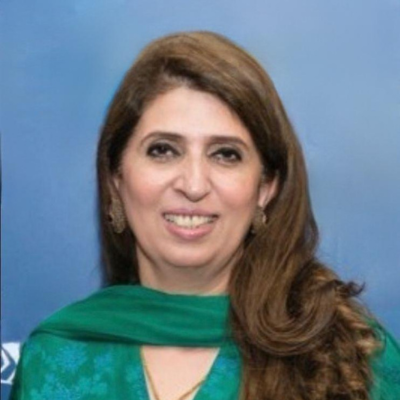Dr Shabnum Sarfraz is currently working as the Deputy Executive Director for the Women in Global Health, an organization with 57 chapters operating across 51 countries and committed to promoting gender equity and increase the percentage of women in health leadership. Prior to this she worked for the Federal Planning Commission, Government of Pakistan, headed by the Prime Minister, where she was the national policy and planning lead for the health, education, youth and gender portfolios. She led Pakistan's national COVID19 response efforts and was the force behind the launch of the country’s first ever national gender policy framework. She has served as the Senior Technical Advisor for Marie Stopes International UK and Regional Human Resource for Health Advisor for WHO. She is a Harvard University Global Health LEAD Fellow and is recipient of Vice-Chancellor’s Alumni Awards 2021 as conferred by the University of Surrey in recognition of her extraordinary professional achievements.
All Sessions by Dr Shabnum Sarfraz
Women in Global Health: Defying Backlash and Cultivating Leadership for Gender-Responsive Health Systems
Led by: Women in Global Health.
Women in Global Health (WGH) was the first organization to campaign for gender equality in health leadership. Since launching its movement in 2015, its global advocacy is supported today by 57 country chapters across 51 countries. Collectively they have garnered considerable political awareness and momentum towards advancing gender equity in women’s leadership through gender transformative leadership.
UHC is expected to be a game changer for women’s health rights but the progress in many countries is threatened by a growing global backlash against the rights of women and girls and against wider gender equality Gender-responsive health policies and plans can address the gendered health inequities ensuring that they are tailored to the needs of a diverse population. However, this is possible only if there is an inclusive engagement and effective participation of women in policy and decision-making processes in the health sector as it allows for harnessing the diverse perspectives, expertise and lived experiences. Women’s work – paid and unpaid – forms the essential foundation for health, well-being, and delivery of health systems. Despite constituting 70% of the overall global healthcare workforce, women are vastly underrepresented i.e. only 25% in top leadership positions.
The panel moderated by Dr Shabnum Sarfraz, Deputy Executive Director WGH will bring together a dynamic group of women leaders from Nigeria, Kenya, India, Zimbabwe and US Country Chapters. They will together examine gendered health inequalities; explore the impact of escalating anti-rights backlash against women’s rights; navigate the role of women health workers amidst the evolving health landscape; outline why women’s leadership is critical to establishing gender-responsive health systems and towards achieving Universal Health Coverage (UHC); identify the barriers and enablers to women’s advancement in the health sector and highlight the policy initiatives needed to promote gender equity in health leadership.
Moderator: Dr. Shabnum Sarfraz, Global Director, Gender and Health/ Deputy Executive Director, Women in Global Health
Panelists:
1. Ms. Lanice Williams, Independent Consultant, Chair, Women in Global Health Washington, DC Chapter
2. Dr. Choolwe Jacobs WGH Zambia
3. Sapna Kedia, WGH India
4. Ruth Ngechu, WGH Kenya
5. Prof Rhoda Wanyenze, WGH Uganda

